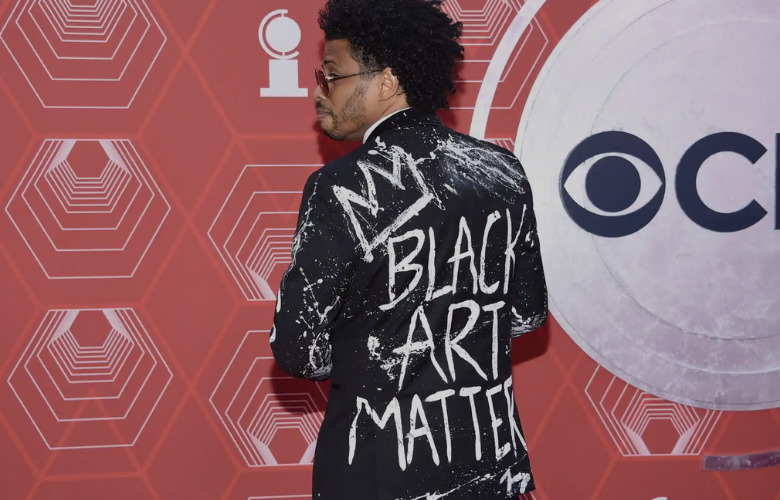
On Sunday, September 26, the long-awaited 74th Annual Tony Awards aired, promising a new theatre industry that is equitable and accountable. Showing a triumphant return to Broadway, the two-part ceremony was to celebrate an industry gone for a year and a half. In that year and a half, however, social change begun. The insurgence of the Black Lives Matter movement made its way to the Great White Way, which has been telling its many workers that big change is coming to the industry, and that it will come out as a better Broadway. But was that reflected at the awards ceremony?
From the opening of the awards ceremony to the end of the special “Broadway’s Back” concert, inclusivity and diversity seemed to be the theme of the evening. The show opened with a special reunion performance by the Broadway cast of Hairspray, which featured performer Chester Gregory wearing a jacket with “BLACK ART MATTERS” on the back.
In her opening monologue, host Audra McDonald also mentioned diversity and accountability.
“For the past 46 years there has been too little change,” McDonald said in her speech to much applause. “But I am hopeful that we are finally ready to commit to the change that will bring more awareness, action and accountability toward making our theatrical industry more inclusive and equitable for all.”
Throughout the course of the night, winners repeated this thought in their own acceptance speeches.
Moulin Rouge! The Musical’s Sonya Tayeh accepted the award for Best Choreography and said, “As a brown, queer, Arab-American woman, I wasn’t always welcome.”
The Broadway Advocacy Coalition, founded in 2016 in response to police brutality, made multiple appearances, accepting a Special Tony Award and later performing.
Matthew Lopez, playwright of The Inheritance, accepted the award for Best Play and expressed that he was the first and only Latine playwright to win in that category.
“I say that not to elicit your applause, but to highlight the fact that the Latine community is underrepresented in American theater, and most especially on Broadway,” Lopez said.
In accepting the award for Best Revival of a Play for A Soldier’s Play, director Kenny Leon repeated the names of Breonna Taylor and George Floyd, emphasizing the need to do better.
“We need to hear all of the stories. When we hear all of the stories, we are better.”
As is often seen with awards ceremonies, the wins and losses alike were controversial. Lauren Patten’s win for Best Featured Actress for her role as Jo in Jagged Little Pill reflected the recent controversy with the show.
Jagged Little Pill has recently come under fire for a plethora of issues – one such issue involved Patten and her character. During the show’s original run in Boston, the character Jo was portrayed as non-binary. However, when the show moved to Broadway, the character was rewritten as a cisgender female. The show’s creative team then denied the character’s gender change until recently when they released a statement regarding the issue.
Patten addressed the statement in her acceptance speech, thanking those trans and non-binary people who spoke up about their discomfort and anger with the show.
“First and foremost, I want to thank my trans and non-binary friends and colleagues who have engaged with me in difficult conversations, that have joined me in dialogue about my character Jo.”
This issue was accompanied by allegations of mistreatment by the cast of the show, leading several cast members to announce their departure. Tony nominee Celia Rose Gooding, Anthony Cipriano and Nora Schell will be leaving the show due to these allegations. Schell, a non-binary cast member, revealed that they had been “intimidated, coerced and forced by multiple higher ups” to put off necessary surgery for their polycystic ovarian syndrome. They dealt with anemia as a result of their PCOS, leading to them passing out during a dress rehearsal but being told to keep going.
Another issue was seen with the now-most nominated non-musical play, Slave Play, that garnered 12 nominations yet won none. The controversial play centers on interracial couples at an imaginary sex retreat to speak about slavery in America. The show’s many nominations with no wins is perhaps a reflection of the lack of diversity in Tony voters.
Playwright Jeremy O. Harris told the New York Times, “I know for a person like me, to hope that the systems that you agitate will affirm you, is a lost cause. If I’m hitting a nerve that people don’t like to be hit, there’s no reason for them to be like, ‘Now come, I’m going to give you a prize for that.’”
As Patten said in her speech accepting her controversial win, the industry is at a reckoning. This was evident throughout the course of the show as many expressed the need for greater inclusivity and equity. Unfortunately, not everyone is there yet. Hopefully, as theatre returns, greater strides and efforts to being better will be made.
Change is inevitable and necessary. But in order for the theatre industry to truly make the changes it promises, there needs to be major improvements in all facets, going all the way to the top. Then, a truly equitable and inclusive industry can reign.
“Broadway is back, and it must—it WILL—be better.” -Audra McDonald
Reopening Broadway Strives for Inclusion and Diversity
IATSE Preparing to Strike Against Major Producers

© 2021 TheatreArtLife. All rights reserved.

Thank you so much for reading, but you have now reached your free article limit for this month.
Our contributors are currently writing more articles for you to enjoy.
To keep reading, all you have to do is become a subscriber and then you can read unlimited articles anytime.
Your investment will help us continue to ignite connections across the globe in live entertainment and build this community for industry professionals.